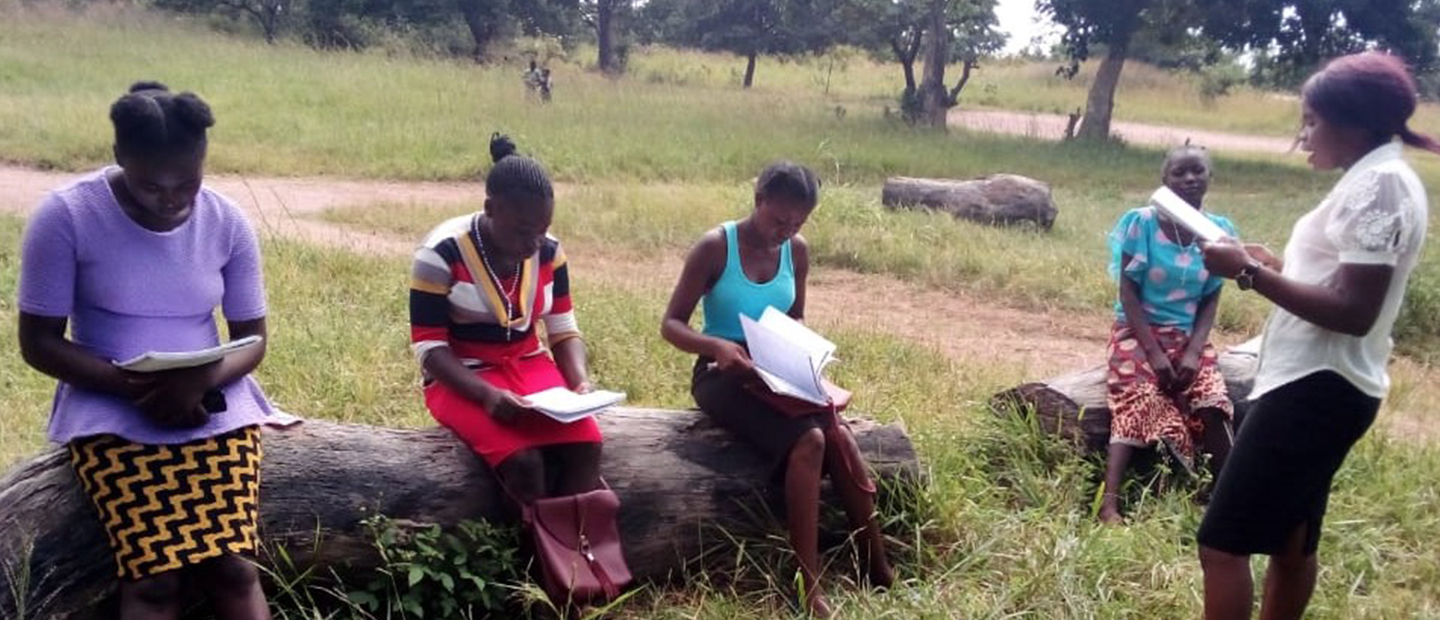
African women leading community action for vulnerable girls

Across rural districts in sub-Saharan Africa, we are coordinating with members of the CAMFED Association to reach out to the most vulnerable girls in their communities, partnering with local services to ensure that they have the information, food, necessities and learning support they need to weather the pandemic, and re-enroll when schools re-open.
Our young leaders are reaching out to parents, students and each other. They are identifying vulnerable families and collaborating with local services and other partners to get basic necessities to families and protect children, as well as supporting learning in collaboration with teachers, in a context where access to technology is extremely limited, and online learning not an option.
Angeline Murimirwa, CAMFED Executive Director – Africa
Across the world, advocacy organizations are urging education authorities to ensure that the most marginalized aren’t left even further behind as the COVID-19 pandemic hits low income countries, with severe health and economic consequences. The threat to girls’ education, in particular, spells long-term disaster, potentially rolling back decades of progress in gender equity and community development. As the Global Partnership for Education reports, “in sub-Saharan Africa, only 11% of households have computers, only 18% have a household internet connection, and 26 million students are not covered by mobile networks.” Never has community activism been more important in providing an agile response that safeguards the most vulnerable – marginalized girls – and keeps open their pathway to education and independence.
Together with members of the CAMFED Association – young women leaders educated with CAMFED support in Ghana, Tanzania, Malawi, Zambia and Zimbabwe – we are combining advocacy and action during this critical time.
During the coronavirus pandemic trained CAMFED Association ‘Learner Guides’ and ‘Transition Guides’ (who provide social support and life skills sessions to young women in schools and communities) are deploying their expertise to provide tailored support to those most at risk in our partner communities.
Our leaders are driven by their intimate experience of poverty and exclusion, and their determination to leave no girl behind. Their work is bolstered by the respect they have earned through their education activism, and the partnerships we have forged with schools, parents, local and traditional authorities.
Here are just a few examples of what our community-led infrastructure is making possible:
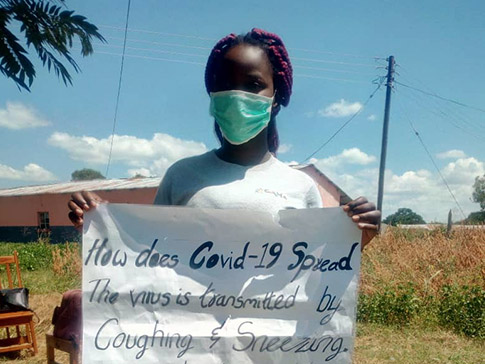
Susan, a CAMFED Association Transition Guide in Zambia, is one of many young women providing COVID-19 information and outreach to communities without connectivity.
Radio to the rescue
Across our countries of operation, local radio has become an even more vital lifeline for families without internet. In Malawi last week, CAMFED Association leader Fatuma from Mangochi joined a radio panel discussion alongside the district coordinator for Secondary Schools, the District Information Officer, a deputy head and some students on how Coronavirus is affecting students, including issues of hunger and pressure to enter into child marriage, and what communities can do in response.
In Ghana, four CAMFED Association leaders, including National Vice Chairperson Pearl, delivered their first in a series of My Better World life skills and wellbeing sessions – usually delivered in classrooms – via radio. In addition, 83 Association members have already participated in 199 phone-in discussions on COVID-19 across 10 districts.
CAMFED’s complementary My Better World curriculum is also being delivered by radio in Ulanga-Morogoro, Tanzania, and in Dar es Salaam, where CAMFED Association leader Diris has been joining phone-in programs on child protection and parenting during the crisis.
In Zambia, Kasama Chairperson Tisiyenji has been speaking on local radio to underscore the risks of early marriage, and the importance of supporting students to continue learning during the COVID-19 crisis. Young women are also using radio interviews as an opportunity to share verified information about the virus, including the importance of hand washing, and local regulations aboutt wearing face masks.
Where communities do not have access to radio, CAMFED Association members are supporting health authorities to disseminate information via public address systems in rural Ghana, and translating Information, Education and Communication (IEC) materials into local languages. In Zambia, for example, they are then working with district officers to print and distribute these materials.
Schools have closed but I am still fighting for the freedom of so many children. I have another child marriage case which will be handled in court by the first grade magistrate this week.
Rose, CAMFED Association leader in Malawi
Preventing child marriage
CAMFED Association leader Rose in Neno, Malawi, is one of many members actively preventing child marriages, not just through radio outreach but by working directly with traditional leaders and magistrates to ensure girls’ right to education is protected. This week Rose helped to bring to justice and annul the 13th child marriage in her community. She and her colleagues have already reached girls in 81 households in her district with information on COVID-19 preventive measures and who to reach out to if they are at risk of early marriage.
Faith, a CAMFED Association Transition Guide in Zimbabwe, recently walked for miles to visit an orphaned girl, who was going to enter into child marriage and abandon her education, because she thought it would improve her financial situation. After discussing the perils of early marriage and the benefits of education using her own story, Faith successfully changed the girl’s mind and will continue to mentor her.
Rose, a CAMFED Association leader and Core Trainer of Learner Guides in Neno District, Malawi, explains how young women are taking action to keep girls safe during the pandemic. Rose is committed to protecting vulnerable girls from child marriage, which becomes an increasing danger during times of crisis.
I am doing revision with ‘transitees’ in Chienge on a conference call today. After I had to return home because of COVID, I bought sim cards for the young women so that we can be revising on the phone once in a week.
Emelicious, CAMFED Association Transition Guide
Direct learning support
Across countries of operation, district staff, teachers and CAMFED Association members are printing and delivering study packages. In Kwekwe district, Zimbabwe, for example, our young women leaders downloaded and printed study packs provided by the Zimbabwe school board, which they are distributing to the first 264 clients this week.
CAMFED Association ‘Guides’ are reaching out to the vulnerable girls and young women they were supporting while schools were open. For those with mobile phone access, they are setting up WhatsApp groups to continue their interactive lessons. In Ghana, for example, students from senior high schools across all CAMFED partner districts are participating in morning and evening sessions of the My Better World life skills program via WhatsApp.
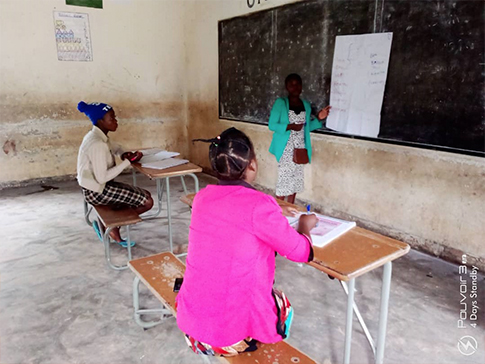
Transition Guide Bridget delivers a learning session in Zambia.
Others are meeting in small, socially distanced groups in empty classrooms, or under trees in villages, where regulations allow. Just in the past week in Mungwi, Zambia, for example, Learner Guides reached out to 184 learners directly.
Together with teachers, they are calling parents to remind them that girls can reach out to them for assistance. They are paying home visits, and offering learning support.
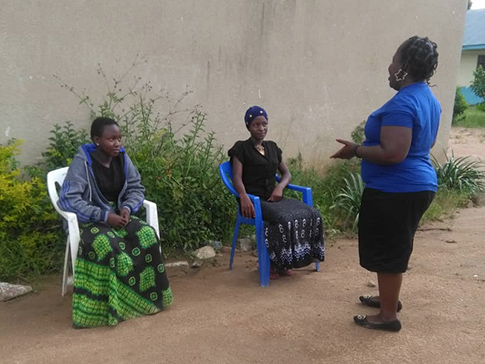
Teacher Mentor Gaudencia has travelled to students’ homes to support them whilst schools are closed.
CAMFED Teacher Mentor Gaudencia Riziki in Tabora, Tanzania, for example, has already visited 10 girls’ homes, and mapped contact details for the 63 at risk children she looks after.
She is raising awareness on risk factors for girls and young women during the lockdown period, such as early pregnancy, sexual transmitted diseases, child labor, domestic abuse and permanently dropping out of school.
In Zimbabwe, CAMFED Association members trained as ECD teachers have taken it upon themselves to continue to teach their pupils in small groups all day, and are also making face masks for the children.
If this is not looking out for the underprivileged children – and ensuring they learn because they do not have access to online learning – then I am yet to be shown what is! CAMFED Association members never stop to count their leisure, but are forever searching for ways of making a difference, of being there for the needy, offering what they have and what they know, protecting, defending, providing till they achieve transformation for children and communities.
Sinikiwe Makove, Head of Programs, CAMFED Zimbabwe
Donating food, soap and face masks
Even though their own businesses and livelihoods are suffering, CAMFED Association members across Africa are clubbing together to raise funds and donate vital food and supplies to those in need. Last week, members across four districts in Zimbabwe used their own resources to buy and deliver food boxes for 200 CAMFED clients – girls who are now out of school and whose families are going hungry as a result of the crisis.
In Lusaka, Zambia, CAMFED Association members delivered food hampers to an orphanage facing significant shortages due to the coronavirus crisis. In Ghana, CAMFED Association members made the headlines when they responded to an urgent appeal by the National Commission for Civic Education (NCCE), which is educating the public on safety measures to prevent the virus from spreading. Young women donated liquid soap, hand sanitizer and face masks to enable staff to safely educate the most remote communities.
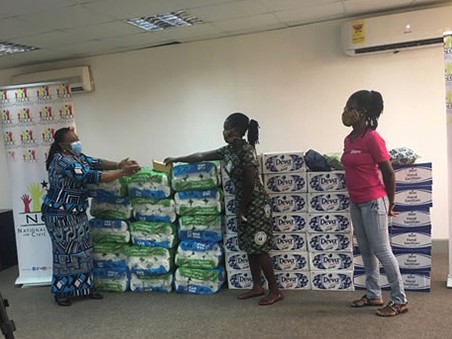
CAMFED Association member Angela presents a donation of soap and cleaning products to the National Commission for Civic Education in Ghana, on behalf of all young women in the national network.
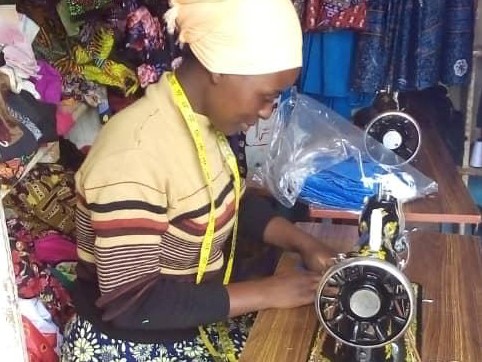
Aloisia, a CAMFED Association member in Tanzania, has been invited to use her tailoring skills to manufacture cloth face masks for her local health care centre.
Across the network, CAMFED Association members are sewing face masks to donate to vulnerable children and the elderly. They are also selling these masks, required to be worn, at affordable prices in rural communities, while informing the public on COVID-19 prevention. In Chikwawa, Malawi, CAMFED Association District Chairperson Zepha led on the distribution of face masks to traditional leaders (village heads). Together with other members she provided details on virus prevention measures to the village authorities, who are sharing the information within their communities.
Young women tailors in Kibiti, Tanzania, are preparing to support vulnerable communities with 200 masks. In Iringa, Tanzania, CAMFED Association member Aloisia took her mother to the local health center wearing one of her home-sewn masks. The doctor in charge was so impressed with the mask that he provided her with the recommended material and asked her to produce 150 masks for his health professionals.
Soap-making has become an even more important business activity for young women across partner communities, as has instruction on correct hand-washing. CAMFED Association members have been donating soap and innovating at hand washing points.
Clarah, the National Chair of the CAMFED Association in Zimbabwe, is helping her community members in Chikomba West to come up with a handwashing mechanism which enables people not to touch the water vessel, as a way to curb the spread of the coronavirus.
Her colleague Tomupei recently donated a 20 litre container of liquid soap for her community borehole, so that everyone fetching water can wash their hands before handling the water source. Tomupei, and many of her CAMFED Association sisters – including Juliet, Linnet and Fortunata, who have returned home to their villages after university closures – are also providing COVID-19 prevention information at their community boreholes.
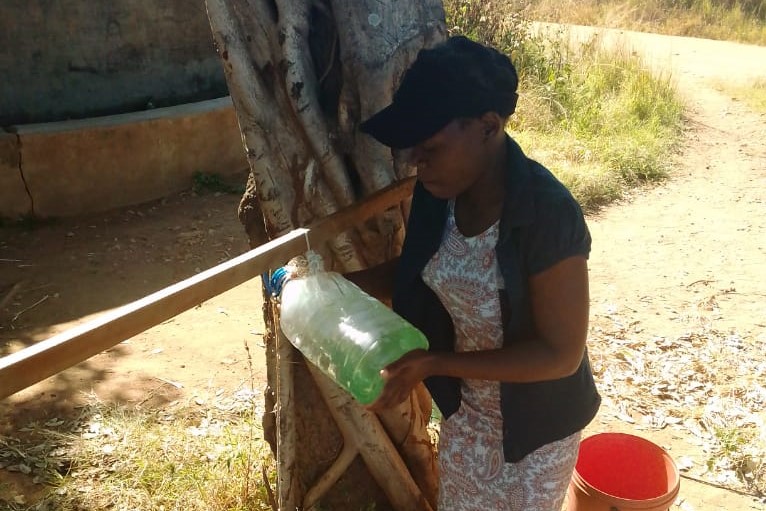
Juliet, a CAMFED Association member in Zimbabwe, provides hand washing soap and health information for community members at the village bore hole, to ensure that the virus isn’t spread at the local water supply point.
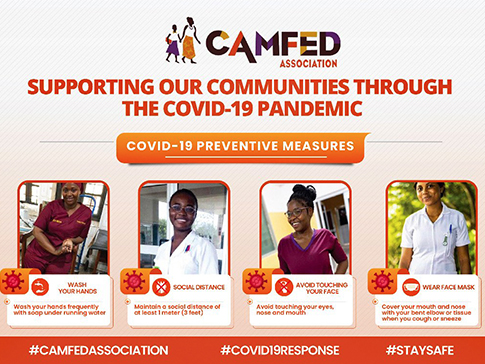
Healthcare workers and members of the CAMFED Association disseminate COVID-19 information on digital platforms.
For the digitally connected, CAMFED Association members – including nurses in Ghana – are taking their virus prevention campaign to social media, creating assets that underscore good hygiene and distancing rules.
The pandemic has resulted in movement restrictions, food shortages, rising food and mobile phone airtime costs, and closures of borders and markets, which our partner communities rely on for their livelihoods. Your support can help young women in the CAMFED Association pivot their businesses and sustain their activism, and helps our entire movement to reach more children more quickly.
Please consider making a gift today, and follow @CAMFED on social media to keep inspired.
For more information, download CAMFED’s COVID Action Brief
